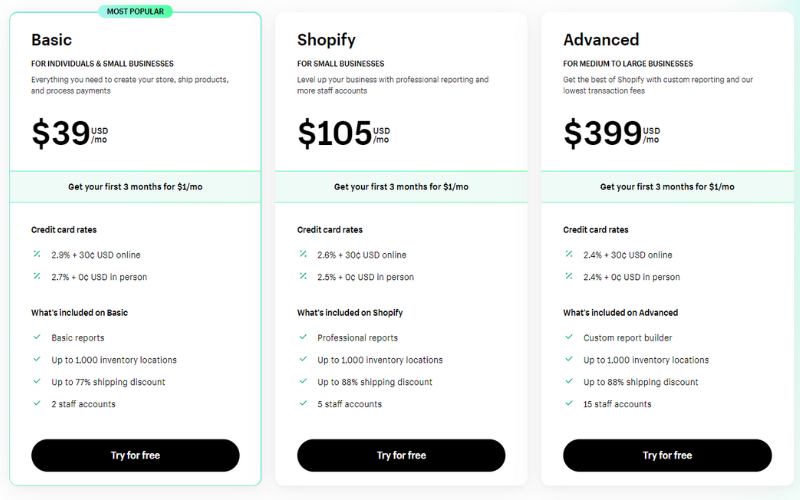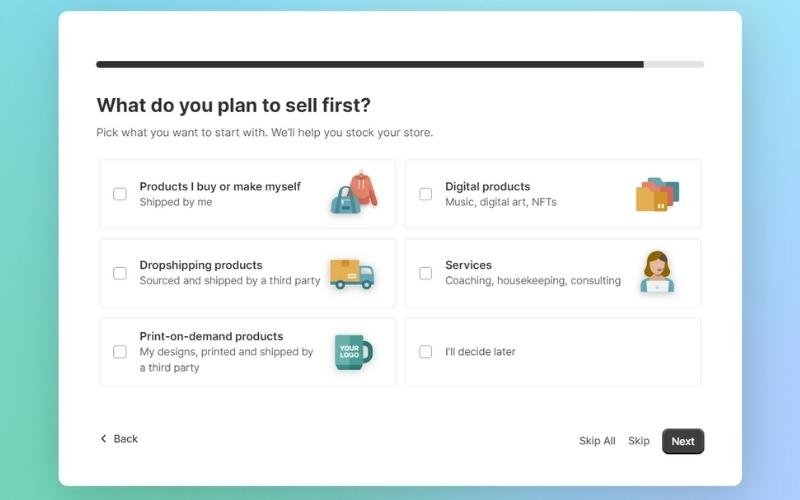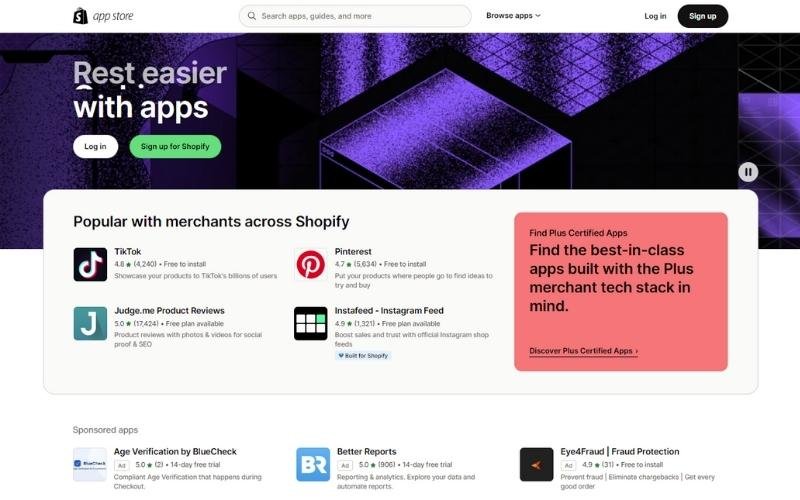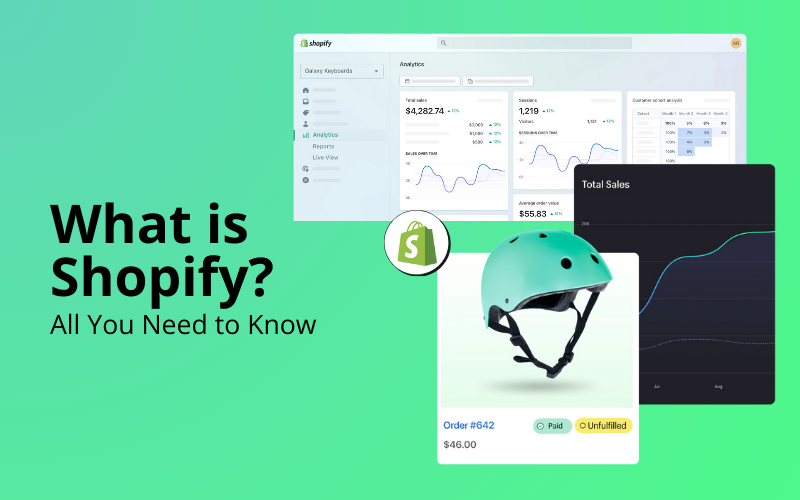Shopify is a comprehensive ecommerce platform that enables businesses to easily create and manage online stores. It provides a user-friendly interface, powerful features, and a range of customizable options, making it an ideal solution for entrepreneurs looking to establish a successful online presence. In this article, we will explore what is Shopify, how it works, what you can sell on Shopify, its pros and cons, pricing options, who uses it, what it is used for, and whether it is suitable for beginners.
Table of Contents
How Does Shopify Work?
Setting up and managing an online store can seem like a daunting task, but Shopify simplifies this process with its user-friendly interface and comprehensive features. Here, we break down the steps to give you a clearer picture of how Shopify operates:
Step 1: Sign Up and Setup

Shopify offers a 14-day free trial, allowing prospective business owners to explore its myriad of features without any initial financial commitment. During the setup phase, users can choose a store name and decide on the look and feel of their site using customizable themes.
Step 2: Centralized Dashboard
Once registered, users gain access to a centralized dashboard called the Shopify Admin. This hub houses all essential data, including product information, customer details, and operational tasks, facilitating a seamless connection to various sales channels. This centralized system is particularly beneficial when expanding into new product lines or sales platforms.
Step 3: Product Sourcing and Inventory Management
Shopify streamlines the process of adding products to your store. Whether you manufacture your products or source them externally, the platform allows for easy input of product details, pricing, and images. Moreover, users can explore Shopify’s Handshake wholesale network to find unique items to sell.
Step 4: Payment Setup
Shopify supports a plethora of payment processors, offering flexibility in choosing the preferred method for transactions. Users can easily integrate over 100 external payment gateways to facilitate secure and smooth transactions.
Step 5: Shipping and Tax Configurations
To ensure a seamless shopping experience, Shopify enables users to configure their preferred shipping methods and fees. Additionally, the platform assists in setting up the applicable sales tax information, ensuring compliance with regional tax regulations.
Step 6: Online Store Customization
Creating a visually appealing online store is a breeze with Shopify. The platform offers a range of plug-and-play themes that require minimal setup. Users can customize these themes to align with their brand identity, creating a cohesive and attractive online presence.
Step 7: Order Management and Fulfillment
Shopify stands out for its efficient order management system. The built-in tools assist business owners in processing, shipping, and tracking orders, ensuring customers receive timely updates and products.
Step 8: Marketing and Sales Promotion
To boost sales, Shopify offers a suite of marketing tools. From email marketing campaigns to abandoned cart remarketing, Shopify equips businesses with the necessary resources to attract and retain customers, fostering business growth.
Step 9: Analytics and Reporting
Shopify provides detailed analytics and reporting features, allowing business owners to track sales trends and customer behaviors. These insights are instrumental in making data-driven decisions and strategizing for future success.
By following these steps, you can set up a successful online store with Shopify, leveraging its user-friendly interface and powerful features to create a successful ecommerce business. If you’re eager to dive in and start setting up your Shopify store, don’t hesitate to check out our comprehensive Shopify tutorial for beginners to guide you through every step of the process.
What is Shopify Used For?
Shopify is used for creating and managing online stores, allowing businesses to sell products and services to customers all over the world. It provides a comprehensive set of tools and features to handle inventory management, payment processing, shipping options, marketing, and more. Additionally, Shopify enables businesses to expand their reach by selling on social media platforms, online marketplaces, and brick-and-mortar locations.
Who Uses Shopify?

Shopify is used by a wide range of businesses, from small startups to large enterprises. It offers an easy-to-use interface and a wide range of features and functionalities that make it easy to create and manage an online store. It caters to various industries, including retail, fashion, beauty, electronics, and more. Many well-known brands and businesses rely on Shopify for their online stores, including Kylie Cosmetics, Gymshark, Heinz, and Penguin Books. Additionally, Shopify provides various marketing tools that can help businesses drive traffic to their site.
Shopify Pricing Plans
Shopify offers different pricing plans to cater to businesses of all sizes and budgets and range from $9 per month up to $2000 or more per month for Shopify Plus businesses.

- Basic Shopify: This plan starts at $29 per month and provides all the essential features for getting started with an online store.
- Shopify: The Shopify plan starts at $79 per month and offers additional features, such as gift cards and professional reports.
- Advanced Shopify: This plan starts at $299 per month and provides advanced features, including advanced report building and third-party calculated shipping rates.
In addition to these plans, Shopify also offers an enterprise-level solution called Shopify Plus, which is designed for high-volume businesses and offers customized pricing.
What Can You Sell on Shopify?
Shopify provides businesses with the flexibility to sell a wide range of products and services. Whether you are a retailer, a service provider, or a digital product creator, Shopify can accommodate your needs.

Physical Products: Shopify allows businesses to sell physical products, such as clothing, accessories, electronics, and more. You can easily manage your inventory, track shipments, and offer various shipping options to your customers.
Digital Products: If you create digital products, such as ebooks, courses, or software, Shopify provides a platform to sell and deliver these products to your customers. You can set up automatic delivery upon purchase, ensuring a seamless experience for your customers.
Services: Shopify also caters to businesses that provide services rather than physical or digital products. Whether you offer consulting, coaching, or any other service, Shopify can help you showcase your offerings and manage bookings or appointments.
Subscription Products: With Shopify, businesses can sell subscription-based products or services. This allows for recurring revenue and ongoing customer relationships. Shopify provides the necessary tools to manage subscriptions, billing, and customer communication.
Pros and Cons of Shopify
Like any platform, Shopify has its pros and cons. Let’s take a look at some of the advantages and disadvantages of using Shopify for your ecommerce business.
Shopify Pros
- User-Friendly Interface: Shopify offers a user-friendly interface that allows businesses to easily set up and manage their online stores without any coding or technical expertise.
- Customization Options: The platform provides a wide range of free and premium themes and templates that can be fully customized to match the brand identity and aesthetic preferences of the business.
- Multi-Channel Selling: Shopify enables businesses to sell their products on various platforms, including social media, online marketplaces, and brick-and-mortar stores, expanding their reach and potential customer base.
- Integrated Payment Processing: Shopify offers integrated payment processing with Shopify Payments or third-party payment gateways, allowing businesses to accept payments from customers using various methods, ensuring secure transactions and streamlined financial management.
- Marketing Tools and Features: Shopify provides a range of marketing tools and features to help businesses promote their products and drive traffic to their online stores, including email marketing, SEO optimization, and social media integration.
Shopify Cons
- Transaction Fees: Shopify charges transaction fees for using external payment gateways. However, these fees can be avoided by using Shopify Payments, the platform’s integrated payment processing solution.
- Customization Limitations: While Shopify offers customization options, some businesses may find the platform’s design limitations restrictive, especially if they require advanced customization or unique features.
- Additional App Costs: While Shopify provides many built-in features, some advanced functionalities may require the use of third-party apps, which can come with additional costs.
- Learning Curve: For beginners who are new to ecommerce, Shopify may have a slight learning curve, as it requires some time and effort to fully understand and utilize all of its features and functionalities.
Is Shopify Good for Beginners?
Yes, Shopify is an excellent platform for beginners who want to start an ecommerce business. It offers an intuitive interface, easy-to-use tools, and step-by-step guidance to help beginners set up and manage their online stores. Shopify’s extensive documentation, customer support, and community forums provide valuable resources for beginners to learn and grow their ecommerce businesses.
What is the Shopify App Store?

Shopify’s extensive app store allows businesses to further enhance their online stores with additional functionalities and integrations. From accounting and inventory management to marketing automation and customer support, Shopify’s app store offers a wide range of third-party apps to meet specific business needs.
Shopify Alternatives
While Shopify might be the most popular choice for online store owners it’s not the only ecommerce platform available. Depending on your specific needs and budget, one of these platforms may be a better fit for your business:
Wix

Wix is a user-friendly ecommerce platform ideal for both beginners and professionals looking to establish a dynamic online store. Known for its intuitive drag-and-drop interface, it offers a variety of stylish templates that can be customized to reflect your brand’s identity. Additionally, it provides essential features such as secure payment options, inventory management, and SEO tools, along with analytical resources to track your store’s performance and facilitate business growth. Its adaptability makes it a popular choice for startups and small businesses entering the ecommerce arena.
BigCommerce

BigCommerce is an ecommerce platform that allows you to create and manage your online store. It offers a wide range of features, including customizable themes, secure payment gateways, inventory management, and marketing tools. With BigCommerce, you can easily set up and customize your store to match your brand’s unique style. It also provides advanced analytics and reporting to help you track your store’s performance and make data-driven decisions. BigCommerce is known for its simplicity and user-friendly interface, making it a popular choice among small and medium-sized businesses.
Square Online

Square Online stands as a dynamic ecommerce platform that caters to the evolving needs of both businesses and customers. It offers a unified system that integrates seamlessly with any Square POS, facilitating efficient management of online and in-store sales. The platform is designed to enhance the online shopping experience, offering personalized customer accounts, mobile-friendly design, and targeted product promotions. Moreover, it supports subscription sales and a variety of payment methods, including a buy now, pay later option with Afterpay.
Squarespace

Squarespace is a website builder that includes ecommerce functionality, allowing you to create an online store. It offers a variety of professionally designed templates that you can customize to match your brand’s style. Squarespace provides features like inventory management, secure payment processing, and built-in SEO tools. It also integrates with popular third-party services like Stripe and PayPal. Squarespace is known for its user-friendly interface and drag-and-drop editor, making it easy for beginners to create a stunning online store without any coding skills.
WooCommerce

WooCommerce is a popular ecommerce plugin for WordPress websites. It allows you to turn your WordPress site into a fully functional online store. WooCommerce offers a wide range of features, including customizable themes, secure payment gateways, inventory management, and marketing tools. It also provides extensions and plugins to add additional functionality to your store. WooCommerce is known for its flexibility and scalability, making it a great choice for businesses of all sizes. It is open-source, which means you have full control over your store’s customization and can integrate it with other WordPress plugins seamlessly.
Final Thoughts
Shopify is a all-in-one ecommerce platform that provides businesses with the necessary tools and resources to create, launch, and manage successful online stores. Whether you are a beginner or an experienced entrepreneur, Shopify offers a user-friendly interface, customization options, multi-channel selling capabilities, and integrated payment processing to help you grow your business. With its range of pricing plans and extensive app store, Shopify caters to businesses of all sizes and budgets. So, if you’re ready to start your online store, Shopify is one of the most reliable and efficient options to consider.
Frequently Asked Questions (FAQs)
Is Shopify Legit?
You might be wondering if Shopify is a reliable choice amidst the surge of e-commerce platforms. Fortunately, Shopify has established itself as a secure and trustworthy option since its inception in 2006. Its listing on the New York Stock Exchange attests to its stability and growth. The platform prioritizes data security, adhering to strict standards to protect your and your customers’ information during transactions, allowing you to focus on expanding your business without concerns of data breaches.
Does Shopify Have a Free Trial?
Yes, Shopify offers a 14-day free trial, allowing you to explore its features without any financial commitment. You can sign up without a credit card, giving you a risk-free opportunity to determine if it’s the right platform for your online business venture.
Is Shopify Good for Small Business?
Shopify is an excellent platform for small businesses due to its user-friendly interface, customizable themes, and comprehensive pricing plans. It provides all the necessary tools and features that small business owners need to set up and run a successful online store, making it a popular choice in the ecommerce industry.
Is Shopify Worth It?
The answer largely hinges on your specific goals and the scale at which you envision your online business. Generally speaking, yes, it stands as a worthy investment. While simpler ecommerce platforms might not offer the same level of support and all-in-one capabilities, Shopify stands out by providing everything you need to streamline the selling and shipping processes, fostering a seamless growth trajectory for your business.
Is Shopify Easy to Use?
Yes, Shopify is easy to use, even to those with little to no technical expertise. Its intuitive design, coupled with a ton of tutorials and customer support, ensures a smooth and straightforward setup and management of your online store.



